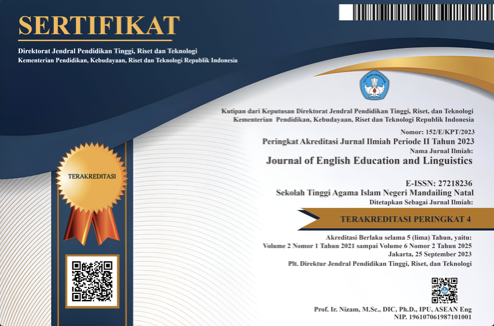Speech Wheel: An Intervention in Reducing Speaking Aporia of Freshmen English Major Students
DOI:
https://doi.org/10.56874/jeel.v2i1.408Abstract
Speaking aporia is a usual problem for many learners that hinder them to communicate and affects their learning performance. It is defined as a distinct complex of self-perceptions, beliefs, feelings, and behaviors related to the use of second language for communication. This encouraged the researchers to come up with a study of reducing the speaking aporia through Speech Wheel to develop speaking skills, enhance critical thinking, and boost confidence and motivation.
Having the Freshmen English Major students of University of Nueva Caceres as the respondents, this study determined the following (1) the causes of speaking aporia; (2) the level of speaking aporia; and (3) the effects of the Speech Wheel as an intervention.
Through descriptive quantitative method, the researchers were able to identify the following factors that cause the speaking aporia of the respondents: (1) 25 % of them has the fear of standing in front of large groups; (2) 20 % has concern that others are judging them and; (3) 13 % of them fear that they might appear nervous. Using the same method, the researchers found out that 50% of the respondents have moderate level of speaking aporia. Moreover, descriptive qualitative method was used to identify the effects of Speech Wheel to the students along with stress, motivation, and self-confidence, these include the following: (1) it reduced the stress level of the students in terms of speaking as they enjoyed the activity; (2) their self-confidence and motivation improved especially in speaking in front of the large groups of people; and (3) it stimulated the students in speaking.
The researchers concluded that factors that affect students’ ability in speaking were shown through their stress, motivation, and self-confidence. Speech wheel is an effective intervention to reduce the speaking aporia of the students and the researchers recommend that it must be used as an intervention that exposes the students to be more confident and boosts their self- confidence.
References
Atas, M. (2015). The Reduction of Speaking Anxiety in EFL Learners through Drama Techniques. Elsevier B.V, 961-969.
Bagagnan, J. (2016). Teachers' Communication AccommodationStrategies and Students Second Language Anxiety: Inputs to the Development of a Communication Instructional Design. Naga City: University of Nueva Caceres, GraduateStudies.55
Bare, B. (2015). Students Proficiency in Language Arts andLearning Resource Utilization in Saint Joseph School. Naga City: University of Nueva Caceres, Graduate Studies.
Chou, M.-H. (2018). Speaking Anxiety and Strategy Use for Learning English as a Foreign Language in Full and Partial English‐Medium Instruction Contexts. TESOLInternational Association, p.611-623.
Hernandez, H. (2014). English Professors' Efficacy and TheirStudents Language System Speaking Anxiety. Naga City:University of Nueva Caceres, Graduate Studies.
Iida, Y. (2012). Some Suggestions Pertaining to Teaching andLearning in Order to Improve Communication Skills in English as a Foreign Language in Japapnese Middle and High Schools. Japan: KwanseiGakuin University.
Krashen, S. D., & Terrell, T. D. (1983). The Natural Approach:Language Acquisition in the Classroom.
Leong, L.-M., & Ahmadi, S. M. (2017). An Analysis of Factors Influencing Learners' English- Speaking Skill. International Journal of Research in English Education,34-41.
Marefat, M. S. (2014). The Effects of Foreign Language Anxietyand Test Anxiety on Foreign Language Test Performance. Islamic Azad University, Shahr-e-Qods branch, Iran: Academy Publisher.
Richardson, J. (2016, August 14). Retrieved from WakingTimes: https://www.wakingtimes.com/2016/08/14/the-science-why-humans- constantly-compare-themselves-others/
Tran, T. (December 2011, December). A Review of Horwitz, Horwitz and Cope’s Theory of Foreign Language Anxiety and the Challenges to the Theory. English LanguageTeaching, 69-73.
Zhiping, D. (2013). Anxiety of speaking english in Class among International Students in a Malaysian University. International Journal of Education Research, 1-16.
Downloads
Published
Issue
Section
License
All articles published in the Journal of English Education and Linguistics are licensed under a Creative Commons Attribution-ShareAlike 4.0 International (CC BY-SA) license. This means anyone is free to copy, transform, or redistribute articles for any lawful purpose in any medium, provided they give appropriate attribution to the original author(s) and Journal of English Education and Linguistics, link to the license, indicate if changes were made, and redistribute any derivative work under the same license.
Copyright on articles is retained by the respective author(s) without restrictions. A non-exclusive license is granted to the Journal of English Education and Linguistics to publish the article and identify itself as its original publisher, along with the commercial right to include the article in a hardcopy issue for sale to libraries and individuals.
Although the conditions of the Creative Commons Attribution-ShareAlike 4.0 International (CC BY-SA) license do not apply to authors (as the copyright holder of your article, you have no restrictions on your rights), by submitting to the Journal of English Education and Linguistics, authors recognize the rights of readers and must grant any third party the right to use their articles to the extent provided by the license.

This work is licensed under a Creative Commons Attribution-ShareAlike 4.0 International License.








